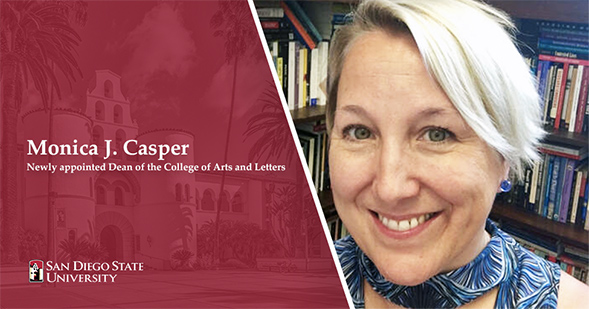Getting to Know College of Arts and Letters Dean Monica J. Casper
The new dean previously served as associate dean for faculty affairs and inclusion in the College of Social and Behavioral Sciences at the University of Arizona.

On Aug. 3, the San Diego State University College of Arts and Letters welcomed Monica J. Casper as its new dean.
Casper offers experience as a sociologist and administrator spanning three decades. For the past five years she was associate dean for faculty affairs and inclusion in the College of Social and Behavioral Sciences at the University of Arizona.
“With the launch of our university’s strategic plan before us, it was clearly apparent to me and the Search Committee for the Deanship of the College of Arts and Letters (CAL) that Monica is exactly the type of leader our university needs now,” Salvador Hector Ochoa, Provost and Senior Vice President for Academic Affairs, said in his letter announcing her appointment.
In her first note to faculty and staff, Casper wrote: “It is a challenge to ‘hit the ground running’ when the ground is largely Zoom. But here we are, and I look forward to meeting and working with each and every one of you.”
The SDSU News Team asked Casper about her plans as dean, CAL’s role in the university’s next phase of growth, and the importance of universities in the community.
What makes you suited for this role?
I bring an unusual career trajectory and skill set to this position. I left academia several years ago and ran a nonprofit, then came back into academia. I understand and have worked across different sectors. And I’ve continued my engagements in the nonprofit sector as a member of boards, a consultant, and a financial supporter.
I also come with significant digital experience, which is somewhat unusual in a Gen-X-aged academic. For example, I’m co-owner and co-manager of The Feminist Wire, an anti-racist feminist site founded by Black feminists. At the site’s peak, we had over a million readers annually. I’m also an administrator who has continued, in my minimal “spare” time, to conduct research and write. My next book, on infant mortality and racism, will be out in 2021-22.
How should a dean relate to students?
I’m as passionate about students and their success as I am about faculty, including professional development and striking a work-life balance.
I believe I’m approachable; sometimes, senior academic leaders can be intimidating to students, family members, community members, and others, especially in our status-oriented culture. My leadership ethos is service, and to me that means being approachable and available for everyone, from first-year students to First Gen parents, from donors to staff, and from colleagues to councilmembers. As a First Gen student myself, I try to live the belief that universities are a public good and belong to everyone.
What are you most looking forward to at SDSU?
SDSU is a phenomenal place: an HSI (Hispanic-Serving Institution) at the border with R1 (Very high research activity) aspirations, strong leadership, an exciting strategic plan, and dedicated alumni who have remained in the region. This makes for an ideal context for a new dean to come in and build on what’s already in place, while collaborating on new ideas and ventures and enrolling new stakeholders.
I’m excited to help lead CAL into the next phase of SDSU’s growth, including figuring out how to meld an undeniable love for teaching and students with R1 aspirations.
In what key areas do you hope to have an impact?
I come with significant experience innovating faculty affairs, including finding new and better ways to support faculty of all ranks and categories. I aim to provide leadership that is deeply attentive to faculty concerns and needs. I’m also demonstrably committed to diversity, equity and inclusion, and am eager to collaborate with others at SDSU who are already doing great work in this area.
As an interdisciplinary scholar, I’m interested in partnering with faculty in CAL and across colleges to build exciting undergraduate and graduate programs that meet the needs of the region. I’m also committed to finding new ways to serve students, especially in the post-COVID-19 environment, whatever that will look like. Access and quality need not be opposed; I’m hoping to work with folks in CAL and across the university in exploring online, hybrid, and global opportunities alongside in-person pedagogy.
What is your leadership style?
Transparent, collaborative, optimistic, supportive, dependable, ethical, and strategic. I also strive for fun (as appropriate), because even tough, hard issues like those facing higher education don’t preclude enjoying oneself at work and laughing with colleagues.
What aspects of working in academia keep you engaged and interested?
Academia touches so many lives; Students, first and foremost, through education. But higher education also impacts communities and society through research and outreach. Universities are often vital centers of their communities, cities, and regions, not only as large employers, but for the kinds of ideas, creative works, discoveries, theories, findings, patents, partnerships, and collaborations they bring. For me, universities — even in tough times, like now — are one of the best incubators we have for innovating social change.



